- Home
- T. H. White
The Once and Future King (#1-4) Page 46
The Once and Future King (#1-4) Read online
Page 46
The Queen was silent.
‘I loved him,’ said Elaine. ‘I bore a fine son for him, who will be the best knight of the world.’
‘Elaine,’ said Guenever, ‘go away from my court.’
‘I am going.’
Guenever suddenly caught her by the skirt.
‘Don’t tell anybody,’ she said quickly. ‘Don’t say anything about what happened. It will be his death if you do.’
Elaine freed the skirt.
‘Did you expect I would?’
‘But what are we to do?’ cried the Queen. ‘Is he mad? Will he get better? What will happen? Ought we to do something? What are we to say?’
Elaine would not stay to talk with her. At the door, however, she turned with a trembling lip.
‘Yes, he is mad,’ she said. ‘You have won him, and you have broken him. What will you do with him next?’
When the door was closed, Guenever sat down. She dropped her tattered handkerchief. Then – slowly, deeply, primitively – she began to cry. She put her face in her hands and throbbed with sorrow. (Sir Bors, who did not care for the Queen, once said to her: ‘Fie on your weeping, for ye weep never but when there is no boot.’)
Chapter XIX
King Pelles was sitting in the solar with Sir Bliant two years later. It was a fine winter morning with the fields frosted, no wind, and a light fog which was not enough to confuse the pigeons. Sir Bliant, who had been staying the night, was dressed in scarlet furred with miniver. His horse and squire were in the courtyard, ready to take him back to Castle Bliant, but the two men were having their elevenses before he started. Sitting with their hands spread to the splendid log fire, they sipped their mulled wine, nibbled pastry, and talked about the Wild Man.
‘I am sure he must have been a gentleman,’ said Sir Bliant. ‘He kept doing things which nobody but a gentleman would do. He had a natural leaning to arms.’
‘Where is he now?’ asked King Pelles.
‘God he knows. He vanished one morning when the hounds were at Castle Bliant. But I am sure he was a gentleman.’
They sipped and gazed into the flames.
‘If you want to have my opinion,’ added Sir Bliant, lowering his voice, ‘I believe he was Sir Lancelot.’
‘Nonsense,’ said the King.
‘He was tall and strong.’
‘Sir Lancelot is dead,’ said the King. ‘God be good to him. Everybody knows that.’
‘It was not proved.’
‘If he had been Sir Lancelot, you could not have mistaken him. He was the ugliest man I have ever seen.’
‘I never met him,’ said Sir Bliant.
‘It was proved that Lancelot ran mad in his shirt and breeches, until he got gored by a wild boar and died in a hermitage.’
‘When was that?’
‘Last Christmas.’
‘It was about the same time that my Wild Man ran away with the hunt. Ours was a boar hunt too.’
‘Well,’ said King Pelles, ‘they may have been the same person. If they were, it is interesting. How did your fellow arrive?’
‘It was during the summer questing, the year before last. I had my pavilion pitched in a fair meadow, in the usual way, and I was inside it, waiting for something to turn up. I was playing chess, I remember. Then there was a frightful row outside, and I went out, and there was this naked lunatic lashing on my shield. My dwarf was sitting on the ground, rubbing his neck – the maniac had half broken it – and he was calling out for help. I went to the fellow and said: “Look here, my good man, you don’t want to be fighting me. Come now, you lay down that sword and be a good chap.” He had got hold of one of my own swords, you know, and I could see that he was mad straightway. I said: “You ought not to be fighting, old boy. I can see that what you need is a good sleep and something to eat.” And, really, he did look dreadful. He was like a man who had been watching a passager for three nights. His eyeballs were bright red.’
‘What did he say?’
‘He just said: “As for that, come not too nigh: for, an thou do, wit thou well I will slay thee.”’
‘Strange.’
‘Yes, it was strange, wasn’t it? That he should have known the high language, I mean.’
‘What did you do?’
‘Well, I was only in my gown, and the man looked dangerous. I went back into the pavilion and did on my armour.’
King Pelles handed him another pasty, which Sir Bliant accepted with a nod.
‘When I was armed,’ he went on, with his mouth full, ‘I went out with a spare sword to disarm the chap. I did not intend to strike him, or anything like that, but he was a homicidal maniac and there was no other way of getting the sword from him. I went up to him like you do to a dog, holding out my hand and saying, “There’s a poor fellow: come now, there’s a good chap.” I thought it would be easy.’
‘Was it?’
‘The moment he saw me in armour, and with a sword, he came straight at me like a tiger. I never saw such an attack. I tried to parry a bit, and I dare say I would have killed him in self—defence, if he had given me a chance. But the next thing I knew was that I was sitting on the ground, and my nose and ears were bleeding. He had given me a buffet, you know, which troubled my brains.’
‘Goodness,’ said King Pelles.
‘The next thing he did was to throw away his sword and rush straight into the pavilion. My poor wife was there, in bed, with no clothes on. But he just jumped straight into bed with her, snatched the coverlet, rolled himself up in it, and went fast asleep.’
‘Must have been a married man,’ said King Pelles.
‘The wife gave some frightful shrieks, hopped out of bed on the other side, jumped into her smock, and came running out to me. I was still a bit astonished, lying on the ground, so she thought I was dead. I can tell you we had a fine to—do.’
‘Did he sleep right through it?’
‘He slept like a log. We managed to pull ourselves together eventually, and the wife put one of my gauntlets down my neck to stop the nosebleed, and then we talked it over. My dwarf, who is a splendid little chap, said we ought not to do him any harm, because he was touched by God. As a matter of fact, it was the dwarf who suggested that he might be Sir Lancelot. There was a good deal of talk about the Lancelot mystery that year.’
Sir Bliant paused to take another bite.
‘In the end,’ he said, ‘we took him to Castle Bliant in a horse litter, bed and all. He never stirred. When we got him there, we tied his hands and feet against the hour when he would wake up. I am sorry about it now, but we could not chance it according to what we knew at the time. We kept him in a comfortable room, with clean clothes, and the wife gave him a lot of nourishing food, to build up his strength, but we thought it best to keep him handcuffed all the same. We kept him for a year and a half.’
‘How did he get away?’
‘I was coming to that. It is the plum of the story. One afternoon I was out in the forest for half an hour’s questing, when I was set upon by two knights from behind.’
‘Two knights?’ asked the King. ‘From behind?’
‘Yes. Two of them, and from behind. It was Sir Bruce Saunce Pité and a friend of his.’
King Pelles thumped his knee.
‘That man,’ he exclaimed, ‘is a public menace. I can’t think why somebody doesn’t do away with him.’
‘The trouble is to catch the fellow. However, I was telling you about the Wild Man. Sir Bruce and the other one had me at a considerable disadvantage, as you will admit, and I regret to say that I was compelled to run away.’
Sir Bliant stopped and gazed into the fire. Then he cheered up.
‘Ah, well,’ he said, ‘we can’t all be heroes, can we?’
‘Not all,’ said King Pelles.
‘I was sore wounded,’ said Sir Bliant, discovering a formula, ‘and I felt myself faint.’
‘Quite.’
‘These two came galloping with me all the way to the Castle, one on
either side, and they kept hitting me all the time. I don’t know to this day how I got away with my life.’
‘It was written in the Stones,’ said the King.
‘We rode past the barbican loopholes, hell—for—leather, and it was there that the Wild Man must have seen us. We kept him in the barbican chamber, you know. Well, he saw us at all events, and we found out afterwards that he broke his fetters with his bare hands. They were iron fetters, and he had them on his ankles also. He wounded himself dreadfully doing it. Then he came hurling out of the postern, with his hands all bloody and the chains flying about him, and he pulled Bruce’s ally out of the saddle, and took his sword from him, and walloped Bruce on the head so that he knocked him noseling, clean off his horse. The second knight tried to stab the Wild Man from behind – he was absolutely unarmed – but I cut off the fellow’s hand at the wrist, just as he stabbed. Then the both of them caught their horses, and rode away for all they were fit. They rode more than a pace, I can tell you.’
‘That was Bruce all over.’
‘My brother was staying with me that year. I said to him: “Why ever have we kept this dear fellow chained up?” I was ashamed when I saw his wounded hands. “He is happy and gracious,” I said, “and now he has saved my life. We must never chain him up again, but give him his freedom and do everything we can for him.” You know, Pelles, I liked that Wild Man. He was gentle and grateful, and he used to call me Lord. It is a dreadful thing to think that he might have been the great Dulac, and us keeping him tied up and letting him call me Lord so humbly.’
‘What happened in the end?’
‘He stayed quietly for several months. Then the boar hounds came to the castle, and one of the followers left his horse and spear by a tree. The Wild Man took them and rode away. It was as if he were excited by gentlemanly pursuits, you know – as if a suit of armour, or a fight, or a hunt, stirred something in his poor head. They made him want to join in.’
‘Poor boy,’ said the King. ‘Poor, poor boy! It might well have been Sir Lancelot. He is known to have been killed by a boar last Christmas.’
‘I should like to know that story.’
‘If your man was Lancelot, he rode straightaway after the boar they were hunting. It was a famous boar which had troubled the hounds for several years, and that was why the field was not on foot. Lancelot was the only man up at the kill, and the boar slew his horse. It gave him a dreadful wound in the thigh, riving him to the hough bone, before he cut off its head. He killed it near a hermitage, with one blow. The hermit came out, but Lancelot was so mad with his pain and everything that he threw his sword at the man. I heard this from a knight who was actually there. He said there was no doubt about its being Sir Lancelot – he was ugly and all that – and he said that he and the hermit carried him into the hermitage after he had fainted. He said that nobody could possibly have recovered from the wound, and that, in any case, he saw him die. What made him most certain, he said, about the Wild Man being a great knight, was that when he was standing in his death agony beside the dead boar, he spoke to the hermit as “Fellow.” So you see, there may have been a touch of sanity at the end.’
‘Poor Lancelot,’ said Sir Bliant.
‘God be good to him,’ said King Pelles.
‘Amen.’
‘Amen,’ repeated Sir Bliant, looking into the fire. Then he stood up and shook his shoulders.
‘I shall have to be going,’ he said. ‘How is your daughter? I forgot to ask.’
King Pelles sighed, and stood up also.
‘She spends her time at the convent,’ he said. ‘I believe she is going to be received next year. However, we are to be allowed to see her next Saturday, when she comes home on a short visit.’
Chapter XX
After Sir Bliant had ridden away, King Pelles stumped upstairs to do some biblical genealogy. He was puzzled about the Lancelot affair, and interested in it on account of his grandson Galahad. All of us have been driven nearly mad by our wives and sweethearts, but King Pelles was aware that there is a tough streak in human nature which generally prevents us from being quite driven. He thought it eccentric of Lancelot, to say the least, to lose his reason over a lover’s tiff – and he wanted to find out, by looking up the Ban genealogy, whether there had been a streak of lunacy in the family which could account for it. If there were, it might descend on Galahad. The child might have to be sent to the hospital of Bethlehem, which later ages were to call Bedlam. There had been enough trouble without that.
‘Ban’s father,’ said King Pelles to himself, polishing his spectacles and blowing dust off numerous works of Heraldry, Genealogy, Nigromancy, and Mystical Mathematics, ‘was King Lancelot of Benwick, who married the King of Ireland’s daughter. King Lancelot’s father, in his turn, was Jonas, who married the daughter of Manuel of Gaul. Now who was the father of Jonas?’
When one comes to think of it, there may have been a weak link in Lancelot’s mind. This may have been the cupboard skeleton we noticed, ten years ago, at the back of the small boy’s head as he turned the kettle—hat to and fro, in the Armoury of Benwick Castle.
‘Nacien,’ said King Pelles. ‘Drat this Nacien. There seem to be two of him.’
He had got back, through Lisais, Hellias le Grose, Nacien the Hermit – from whom Lancelot probably inherited his visionary tendency – and Nappus, to a second Nacien who, if he existed, would quite upset the King’s theory that Lancelot was but the eighth degree from Our Lord. As a matter of fact, nearly all hermits seemed to be called Nacien in those days.
‘Drat him,’ repeated the King, and he glanced out of the window to see what the noise was about in the street outside the castle.
A Wild Man – there seemed to be a lot of them about this morning – was being run through Corbin by the villagers who had once gone out to welcome Lancelot. He was naked, as thin as a ghost, and he ran along with his hands over his head, to protect it. The small boys running all round him were throwing turfs at him. He stopped every now and then, and caught one of the boys and threw him over the hedge. This only made the boys throw stones. King Pelles could clearly see the blood running over his high cheek—bones, and the sunken cheeks, and the hunted eyes, and the blue shadows between his ribs. He could also see that the man was making for the castle.
In the castle yard, when King Pelles had gone dot—and—carry downstairs, there was quite a crowd of castle folk standing around the Wild Man in admiration. They had lowered the portcullis, to keep the village boys out, and they were disposed to treat the fugitive with kindness.
‘Look at his wounds,’ said one of the squires. ‘Look at that great scar there. Perhaps he was a knight errant before he went mad, and so we ought to give him courtesy.’
The Wild Man stood in the middle of the ring, while the ladies giggled and the pages pointed. He hung his head and stood motionless, without speaking, waiting for what was to be done to him next.
‘Perhaps he is Sir Lancelot.’
There was a great laugh at this.
‘No, but seriously. It was never exactly proved that Lancelot is dead.’
King Pelles went right up to the Wild Man and looked into his face. He had to stoop sideways to do this.
‘Are you Sir Lancelot?’ he asked.
The emaciated, dirty, bearded face: its eyes never even blinked.
‘Are you?’ repeated the King.
But there was no answer from the dummy.
‘He is deaf and dumb,’ said the King. ‘We will keep him as a jester. He looks funny enough, I must say. Somebody get the man some clothes – you know, comic clothes – and put him to sleep in the pigeon house. Give him some clean straw.’
The dummy suddenly lifted both its hands and let out a roar, which made everybody start back. The King dropped his spectacles. Then it lowered its hands again and stood sheepishly, so that the people gave a nervous giggle.
‘Better lock him in,’ said the King wisely. ‘Safety first. And do not hand him his food – throw
it to him. Can’t be too careful.’
So Sir Lancelot was led away to the pigeon house, to be King Pelles’ fool – and there he was locked in, and fed by throwing, and lodged on clean straw.
When the King’s nephew, a boy called Castor, came to be knighted on the following Saturday – this was the ceremony which Elaine was coming home to attend – there was gaiety in the castle. The King, who was addicted to festivals and ceremonials of all sorts, celebrated the occasion royally, by presenting a new gown to every man on the estate. He also celebrated it, regrettably, by making too generous a use of the cellars over which Dame Brisen’s husband presided.
‘Wossle,’ cried the King.
‘Drink hail,’ replied Sir Castor, who was on his best behaviour.
‘Everybody gotter gown?’ shouted the King.
‘Yes, thank you, Your Majesty,’ replied the attendants.
‘Sure?’
‘Quite sure, Your Majesty.’
‘Thas alri, then. Goo’ ole gown!’
And the King wrapped himself in his own gown with great affection. He was a different man on occasions like this.
‘Everybody wants to thank Your Majesty very much for his generous present.’
‘Notter tall.’
‘Three cheers for King Pelles!’
‘Hurrah, hurrah, hurrah!’
‘Warrabout the fool?’ inquired the King suddenly. ‘Fool gotter gown? Where’s the pore fool?’
There was a silence at this, for nobody had remembered to put a gown aside for Sir Lancelot.
‘Notter gown? Nottergotter gown?’ cried the King. ‘Fesha fool at once.’
Sir Lancelot was fetched from the pigeon house, for the royal favour. He stood still in the torchlight with some straws in his beard, a pitiful figure in his jester’s patch—work.
‘Pore fool,’ said the King sadly. ‘Pore fool. Here, have mine.’
And, in spite of all remonstrances and advices to the contrary, King Pelles struggled out of his costly robe, which he popped over Lancelot’s head.
‘Lettim loose,’ cried the King. ‘Givim holly—holly day. Karnkeepamanlocktupforever.’

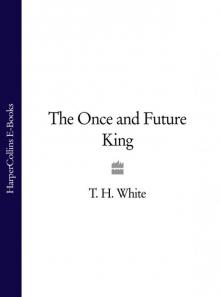 The Once and Future King (#1-4)
The Once and Future King (#1-4) Once & Future King 05 - The Book of Merlyn
Once & Future King 05 - The Book of Merlyn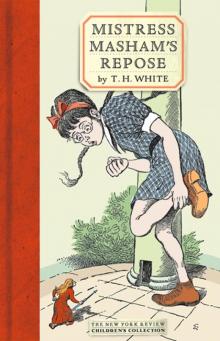 Mistress Masham's Repose
Mistress Masham's Repose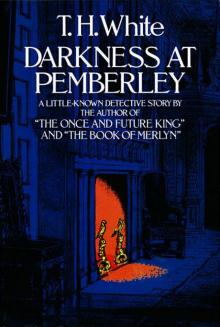 Darkness at Pemberley
Darkness at Pemberley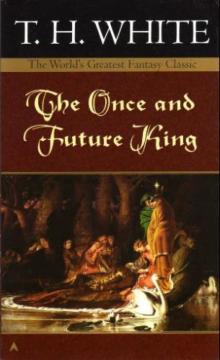 The Once and Future King
The Once and Future King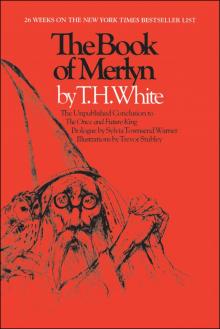 The Book of Merlyn
The Book of Merlyn Candle in the Wind
Candle in the Wind